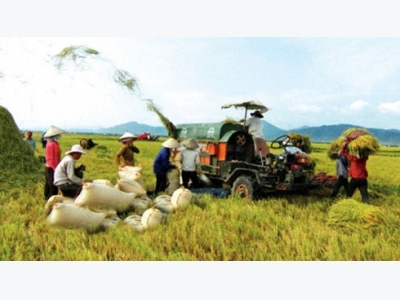Agricultural growth still facing underlying risks

Vietnam’s agricultural growth was not really as high as expected during the past 9 months of this year with a low added value and potential risks.
Despite facing a lot of difficulties over the past three consecutive years, the agro-forestry-fishery sector in the first nine months of this year posted a growth rate of 2.78%, contributing to 0.43% to the general Gross Domestic Product (GDP) growth of the national economy.
Judging from agriculture, forestry and fisheries in the common structure of agricultural growth during the nine-month period, the fishery sector recorded the highest growth of 5.42% over the same period of 2016, forestry sector up 5% and agriculture up 9%.
Agricultural sector is still at potential risks
The consensus among economic experts is that the growth rate of the agriculture sector was underwhelming, posing many potential risks. Therefore, drastic measures are needed to develop the agriculture sector on a sustainable basis.
According to economic expert Vu Dinh Anh during the two years 2014-2016, the agricultural sector encountered a multitude of hurdles, even saw negative growths for many quarters. The risks for the agricultural sector could have harmful affects on the growth rate of the economy. Generally, in all sectors, the agricultural sector still incur the most risks in terms of natural disasters and negative impacts from markets.
Economic expert Luu Bich Ho said that given 70% of Vietnam’s population are employed in the in agricultural sector, it remains a backbone of the national economy, contributing significantly to ensuring social welfare.
He underlined the need to bring in stronger and synchronous measures and apply advanced technology in production and processing to improve the quality of products and increase their added-value.
Limitations in agricultural investment
Regarding major orientations for agricultural development, Ass. Pro Dr. Pham Tat Thang is in agreement, recently saying although both domestic and foreign enterprises are paying greater attention to developing the agricultural sector with engagement in the global value chain, their investment in this field remains limited without making the most of foreign direct investment.
Therefore, more proper policies, especially those regarding land management should be adopted in order to boost agricultural production on a large scale. In addition, it is essential to improve the quality of products and diversify markets to avoid over dependence on a certain market, Thang noted.
Greater cohesion along the line of production, from field to store shelf, would be beneficial for all involved, Thang said.
Economic expert Luu Bich Ho said that a lack of coordination between businesses and farmers will result in unpredictable, negative consequences.
In some cases, the overproduction of certain agricultural products drove prices down.
Economic experts agreed that the State, scientists, businesses and farmers need to take collective action with a focus on enhancing regional connectivity to utilize each region’s strengths towards developing a sustainable agriculture as a contributory factor to the national economy.
Có thể bạn quan tâm
 Digital Farming: What does it really mean?
Digital Farming: What does it really mean? Agriculture 4.0 paves the way for the next evolution of farming consisting of unmanned operations and autonomous decision systems on farming machines
 Rural, agricultural, fishery census 2016 announced
Rural, agricultural, fishery census 2016 announced The General Statistics Office of Vietnam (GSO) held a press conference in Hanoi on October 9 to announce the Rural, Agricultural and Fishery Census 2016.
 Exporting pepper is hard to return to the 'golden age'?
Exporting pepper is hard to return to the 'golden age'? Being the pepper exporting nation is ranked as the first of the world with increasing export turnover for many years, however, from the second half of 2016 back